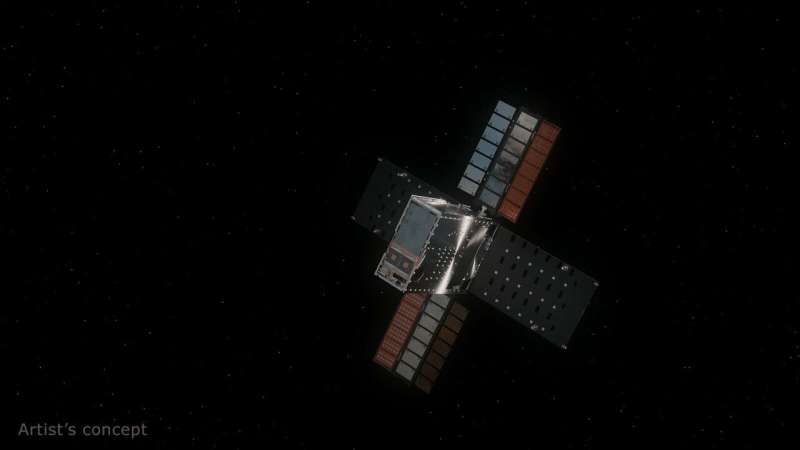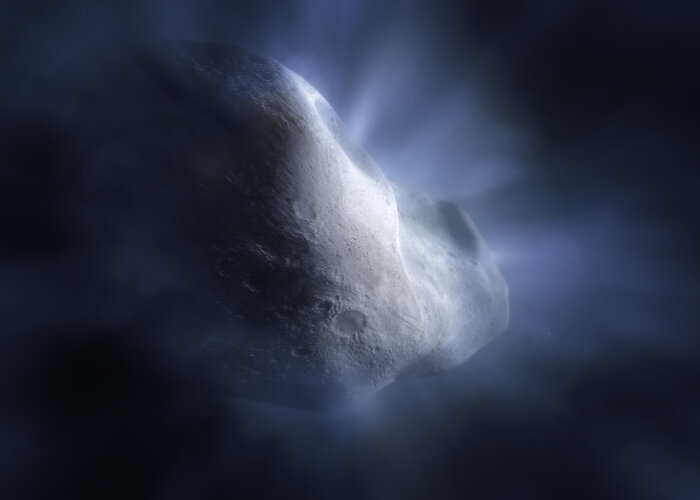Axiom Space's second crewed mission gets green light
Tuesday, 16 May 2023 10:12 Axiom Space's second, entirely private space mission is on track for a Sunday launch aboard a SpaceX Dragon spacecraft to the International Space Station from Kennedy Space Center in Florida, officials said Monday.
The launch is planned for 5:37 p.m. EDT from Launch Complex 39A. Should bad weather set in, controllers could try again the next day.
If the weather does not cooperate
Axiom Space's second, entirely private space mission is on track for a Sunday launch aboard a SpaceX Dragon spacecraft to the International Space Station from Kennedy Space Center in Florida, officials said Monday.
The launch is planned for 5:37 p.m. EDT from Launch Complex 39A. Should bad weather set in, controllers could try again the next day.
If the weather does not cooperate NASA Gears Up to Train Artemis II crew for Moon mission
Tuesday, 16 May 2023 10:12 The four astronauts who will fly on NASA's Artemis II flight are getting ready to begin their training in June, as NASA prepares for the first crewed mission on the agency's path to establishing a long-term presence at the Moon for science and exploration.
NASA astronauts Reid Wiseman, Victor Glover, Christina Hammock Koch, and CSA (Canadian Space Agency) astronaut Jeremy Hansen will compl
The four astronauts who will fly on NASA's Artemis II flight are getting ready to begin their training in June, as NASA prepares for the first crewed mission on the agency's path to establishing a long-term presence at the Moon for science and exploration.
NASA astronauts Reid Wiseman, Victor Glover, Christina Hammock Koch, and CSA (Canadian Space Agency) astronaut Jeremy Hansen will compl NASA's Juno mission closing in on Io
Tuesday, 16 May 2023 10:12 NASA's Juno spacecraft will fly past Jupiter's volcanic moon Io on Tuesday, May 16, and then the gas giant itself soon after. The flyby of the Jovian moon will be the closest to date, at an altitude of about 22,060 miles (35,500 kilometers). Now in the third year of its extended mission to investigate the interior of Jupiter, the solar-powered spacecraft will also explore the ring system where s
NASA's Juno spacecraft will fly past Jupiter's volcanic moon Io on Tuesday, May 16, and then the gas giant itself soon after. The flyby of the Jovian moon will be the closest to date, at an altitude of about 22,060 miles (35,500 kilometers). Now in the third year of its extended mission to investigate the interior of Jupiter, the solar-powered spacecraft will also explore the ring system where s Astra, Momentus face cash crunch
Tuesday, 16 May 2023 09:09
Two startups that went public through SPAC mergers say they are pressing ahead with plans despite warnings that they are running perilously low on cash.
SpaceX has narrow window for Ax-2 launch
Tuesday, 16 May 2023 08:06
SpaceX and Axiom Space will have only two opportunities this month to launch a private astronaut mission to the International Space Station before having to wait potentially several months before getting another shot.
Euclid launch kit link
Tuesday, 16 May 2023 06:38
Euclid launch kit
Interactive infographics and background information to prepare for Euclid’s launch
Space Force general: ‘No pushback’ from Congress on 2024 budget priorities
Monday, 15 May 2023 19:22
Italy awards $256 million contract for 2026 in-orbit servicing mission
Monday, 15 May 2023 19:04
Italy’s space agency has awarded local companies 235 million euros ($256 million) in pandemic relief funds for an in-orbit servicing demo in 2026, the group’s leader Thales Alenia Space announced May 15.
Glass fibers in lunar regolith could help build structures on the moon
Monday, 15 May 2023 17:24
Through the Artemis Program, NASA plans to send the first astronauts to the moon in over 50 years. Before the decade is over, this program aims to establish the infrastructure that will allow for a "sustained program of lunar exploration and development." The European Space Agency (ESA) also has big plans, which include the creation of a moon Village that will serve as a spiritual successor to the International Space Station (ISS). China and Roscosmos also came together in June 2021 to announce that they would build the International Lunar Research Station (ILRS) around the lunar south pole.
In all cases, space agencies plan to harvest local resources to meet their construction and long-term needs—a process known as in-situ resource utilization (ISRU).
NASA calls end to Lunar Flashlight mission after some tech successes
Monday, 15 May 2023 15:19
While the CubeSat couldn't reach the lunar South Pole to help seek ice, it fulfilled several technology goals that will empower future missions for the benefit of humanity.
NASA's Lunar Flashlight launched on Dec. 11, 2022, to demonstrate several new technologies, with an ultimate goal to seek out surface ice in the permanently shadowed craters of the moon's South Pole. Since then, the briefcase-size satellite's miniaturized propulsion system—the first of its kind ever flown—proved unable to generate enough thrust to get into lunar orbit, despite months of effort by the operations team.
The space industry needs COPUOS to rethink its approach to decision-making
Monday, 15 May 2023 15:13
The United Nations Committee on the Peaceful Uses of Outer Space (COPUOS) can’t advance the governance necessary to meet the needs of today’s space sector.
Webb finds water, and a new mystery, in rare main-belt comet
Monday, 15 May 2023 14:00
The NASA/ESA/CSA James Webb Space Telescope has enabled another long-sought scientific breakthrough, this time for Solar System scientists studying the origins of the water that has made life on Earth possible. Using Webb’s NIRSpec (Near-Infrared Spectrograph) instrument, astronomers have confirmed gas – specifically water vapour – around a comet in the main asteroid belt for the first time, proving that water from the primordial Solar System can be preserved as ice in that region. However, the successful detection of water comes with a new puzzle: unlike other comets, Comet 238P/Read had no detectable carbon dioxide.
NASA ends Lunar Flashlight mission because of thruster problems
Monday, 15 May 2023 10:37
NASA has ended the mission of a cubesat intended to go into orbit around the moon but which was unable to do so because of problems with its propulsion system.
JUICE deploys radar antenna
Monday, 15 May 2023 09:51
A radar antenna on a newly-launched European mission to Jupiter has finally deployed after weeks of effort to loosen a stuck pin.
For 191st time, SpaceX booster successfully returns after launch
Monday, 15 May 2023 04:55 SpaceX on Sunday morning successfully deployed another batch of Starlink satellites into space and successfully landed its first-stage booster.
The Falcon 9 rocket with the satellites lifted off from the Cape Canaveral Space Force Station just after midnight, illuminating the night skies over Florida's central east coast.
The first-stage booster then returned to Earth and landed
SpaceX on Sunday morning successfully deployed another batch of Starlink satellites into space and successfully landed its first-stage booster.
The Falcon 9 rocket with the satellites lifted off from the Cape Canaveral Space Force Station just after midnight, illuminating the night skies over Florida's central east coast.
The first-stage booster then returned to Earth and landed 